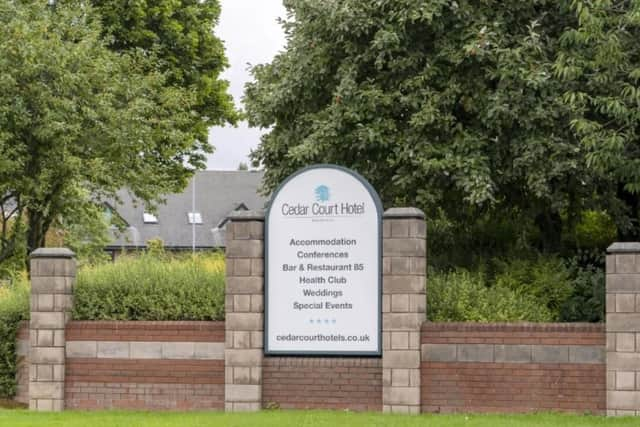Asylum seeker death at Cedar Court Hotel referred to national safeguarding body
and live on Freeview channel 276
Health chiefs have been told that “follow-up action is needed” over the death of Irakli Kapanadze.
Mr Kapanadze, a Georgian asylum seeker, was found dead in the grounds Cedar Court Hotel, on Denby Dale Road, three days after receiving emergency medical treatment for self-harming.
Advertisement
Hide AdAdvertisement
Hide AdAt the time of incident, on September 14 last year, the 37-year-old married father-of-two had been housed at the hotel for almost a year along with other asylum seekers.


Mr Kapanadze’s death was recorded as suicide at an inquest in December.
The case was also referred to Wakefield Safeguarding Adults Board (SAB) to consider whether a statutory review should be carried out
Reviews consider whether agencies could have prevented a death.
Advertisement
Hide AdAdvertisement
Hide AdA document says: “The concerns focused on whether mental health intervention and care was provided in an appropriate and timely manner.”
There were also concerns over “the potential risks posed by a significant increase in the residents” at the hotel during the week of the incident.
Two months before Mr Kapanadze’s death, the Home Office informed Wakefield Council that it intended to more than double the number of asylum seeker spaces at Cedar Court, from 148 to 306.
A panel chose not to commission a review as there was “no evidence that (Mr Kapanadze) had care and support needs”.
Advertisement
Hide AdAdvertisement
Hide AdHowever, the panel felt that the case required further action, including sharing its concerns with the coroner and the national network for SAB chairs.
The report says “findings from the serious incident investigation” will be shared with other agencies.
Members of Wakefield District Health and Care Partnership board were given an update on the case at a meeting on Tuesday (January 9).
Nursing director Penny Woodhead said: “Should there be any further learning from this serious incident investigation, which is ongoing, we can put that back in front of the safeguarding panel.
“These are very tragic, very sad cases.
Advertisement
Hide AdAdvertisement
Hide Ad“What we are doing is taking every opportunity to learn and we have a good system in Wakefield in relation to support for people seeking asylum and broader migrant health in terms of mental health services.
“Every time there is an incident we are taking the opportunity to learn.”
Last month, Wakefield Coroner’s Court heard Mr Kapanadze’s asylum claim was still ongoing at the time of his death and his wife and children remained in Georgia.
The inquest heard that Mr Kapanadze died three days after receiving medical treatment at hospital as a result of self-harming.
Advertisement
Hide AdAdvertisement
Hide AdHe was taken to Pinderfields Hospital and offered a mental health assessment, which he declined.
Mr Kapanadze told medical staff he had phoned home because there was a problem which he “could just not resolve whilst he was in England” but refused to give further details.
Senior Coroner Kevin McLoughlin said: “That seems to have created a sense of helplessness in this poor gentleman.
“That seems to be what prompted his self-harm that day. There was some turmoil in his home life.”
Advertisement
Hide AdAdvertisement
Hide AdThe court heard a welfare officer at the hotel tried to speak to him the next day but he said he did not want to talk about it.
A post-mortem report gave the cause of death as hanging.
The police investigation concluded that there were no suspicious circumstances or suggestion of anyone else being involved in the death.
A Regulation 28 report was not issued following the 15-minute inquest hearing.
Reports can be issued to an individual, organisation, local authority or government department where a coroner believes that action should be taken to prevent further deaths.